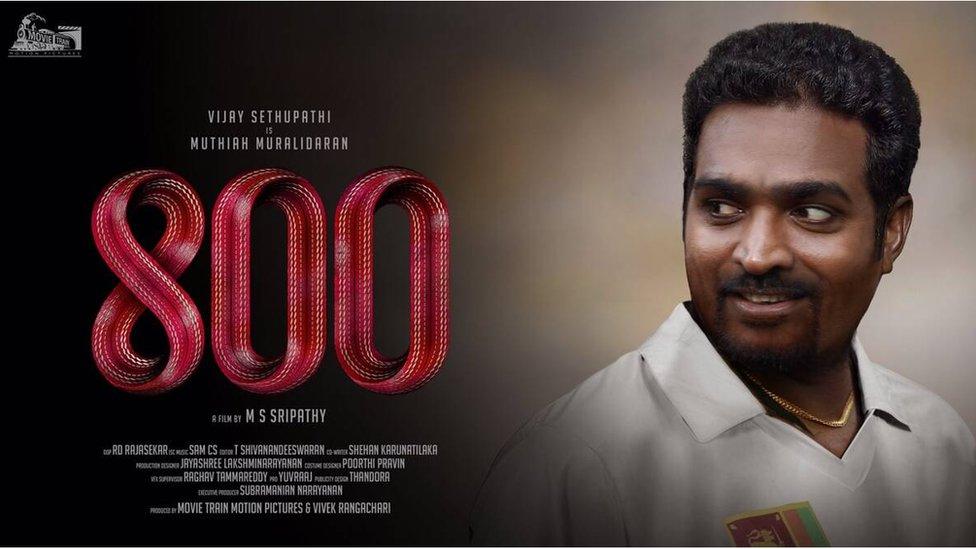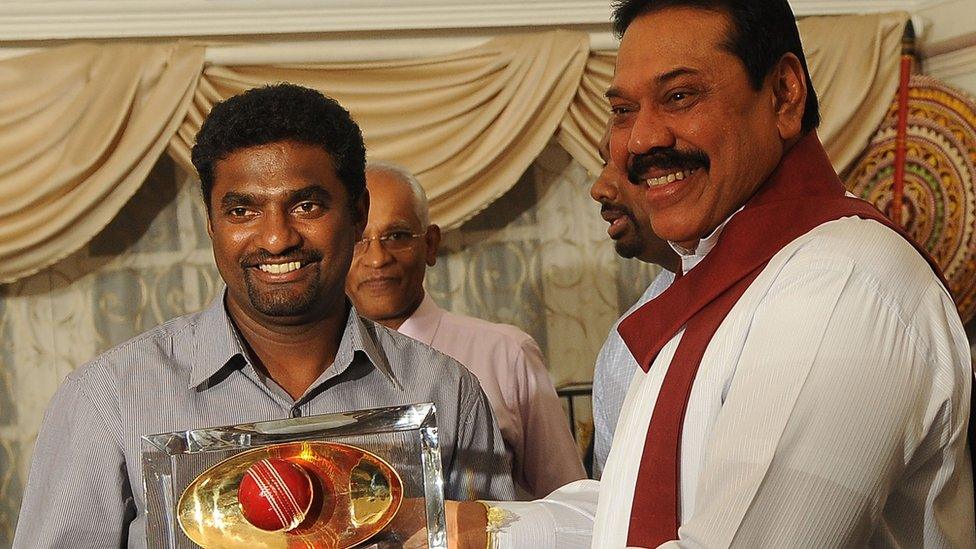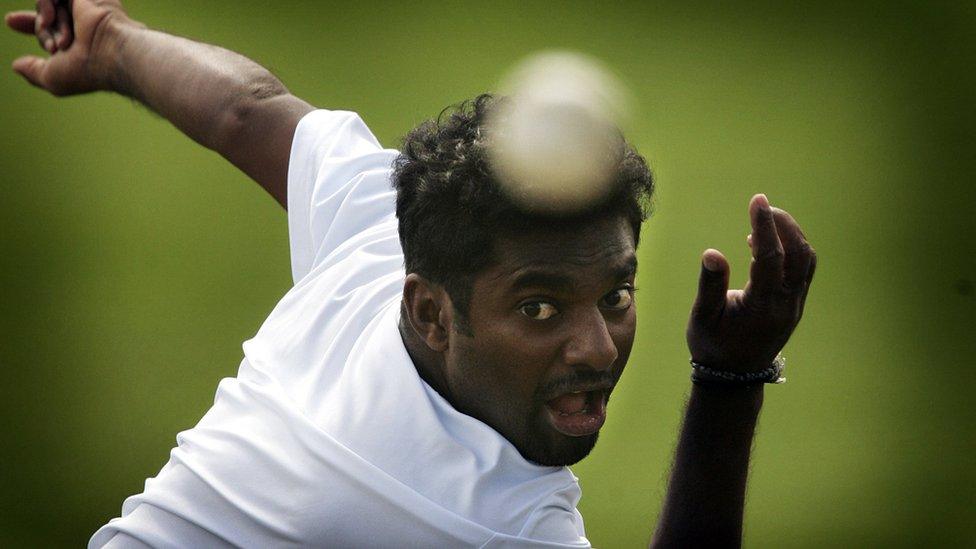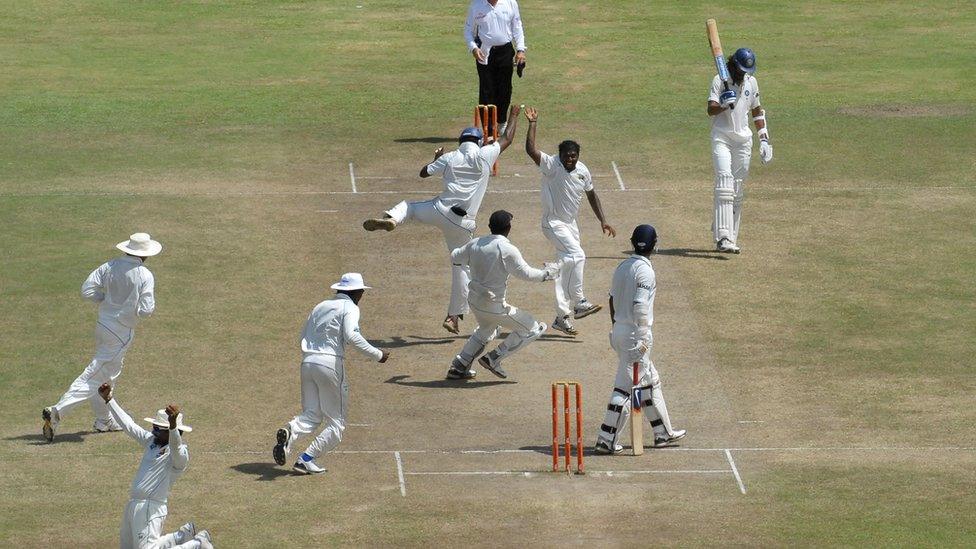Muttiah Muralitharan on the 'challenge' of his disputed biopic
- Published

Former Sri Lankan cricketing great Muttiah Muralitharan says a planned film about his life will be released, despite a massive backlash in south India which caused the lead actor to quit. The BBC's Nalini Sivathasan speaks to him and explains the controversy around the film.
"I've been in so many controversies, not just cricketing. I have got through hurdles. This is just one of the many challenges I've faced," says the 48-year-old of the uproar around the film.
A member of Sri Lanka's minority Tamils, Muralitharan defied the odds to make it on to the national team during a long civil war between Tamil separatists and the Sinhalese-majority security forces.
Then, he battled controversy over his bowling action - he was famously no-balled for "chucking" in Australia - to become one of the most formidable bowlers the cricketing world has ever seen.
However the biopic of his life - entitled 800, a reference to his record-breaking 800 Test match wickets - may be his biggest obstacle yet.
Shooting has yet to start, but when a film poster featuring popular south Indian actor Vijay Sethupathi in the lead role was released there was a massive outpouring of anger
The hashtag #ShameOnVijaySethupathi started trending across the state of Tamil Nadu, with many demanding that he turn down the role.
The film's producers have called it a "sports biography", intended to inspire young people, but critics fear a hagiography, an attempt to glorify someone who has become a controversial political issue.
Much of the outrage stems from Muralitharan's comments at a presidential election event last year, at which he celebrated the end of the war in 2009 and supported the candidacy of Gotabaya Rajapaksa. Mr Rajapaksa was the defence secretary when government forces crushed Tamil Tiger separatists in a brutal campaign that also left tens of thousands of civilians dead.
He said the "happiest day of my life" was in 2009 as the country could now "go on without fear".
An estimated 40,000 Sri Lankan Tamil civilians are believed to have died in the last stages of the war, and it has been an emotive issue in Tamil Nadu, where the same language and ethnic identity are shared.

Muralitharan with Mahinda Rajapaksa who was president in 2009 when the war ended
"Even though Muralitharan is a Tamil, he does not behave as a Tamil, and we don't want him to enter Tamil Nadu in any form - whether in person or on film," said V Prabha, a youth activist based in Chennai (formerly Madras).
"Muralitharan did many wrongs during the Sri Lankan civil war, we don't want him to be a hero in the Tamil community."

Read more about Sri Lanka's civil war

But Muralitharan says his words have been repeatedly "twisted" and taken out of context.
"I meant that after 2009, we had peace in this country. For me when the war finished, it was the happiest day of my life because peace came - not because Tamil civilians were killed," he said, speaking from Dubai, where he is a bowling coach for the Sunrisers Hyderabad team at the Indian Premier League (IPL) tournament being held there.
"I did not take any sides over the war - Rajapaksa side or the other side. I was in the middle. People in India don't know what's happening in Sri Lanka."
Muttiah Muralitharan on retiring and the challenges he has faced in his career
Muralitharan has close links with India, especially Tamil Nadu. His wife is from the state and he represented Chennai when he played for Chennai Super Kings from 2008 to 2010, becoming one of the team's most most popular players.
So why is the film so contentious?
"In 2010, people in Tamil Nadu knew what had happened to Tamils in the Sri Lankan civil war, but they didn't connect Muralitharan to it," said Mr Prabha.
"We then started a campaign showing how he supported the Sri Lankan state, and by 2013, we were able to ban him and other Sri Lankan players here."
In 2013, the Tamil Nadu government banned IPL games with Sri Lankan players from being played in the state, due to alleged human rights violations of Tamils in Sri Lanka.
Kavitha Muralidharan, a freelance journalist in Chennai, says the furore over Muralitharan's biopic has been so intense because of its lead actor, 42-year-old Vijay Sethupathi.
"Sethupathi is seen as a progressive actor, he speaks out on a lot of social issues, so for many people it was troubling to see him choosing to play the role of Muttiah Muralitharan," she said.

Muralitharan has a record 800 Test wickets
"People in Tamil Nadu take cinema very seriously. A movie is not just a movie there - Tamil cinema and politics are inter-related."
Tamil nationalism is often infused into Kollywood, as the Tamil cinema industry is known. A number of the state's chief ministers were actors before they took to politics.
The pressure on Sethupathi to quit came from both film stars and politicians.
But it was Muralitharan's surprise intervention - he asked the actor to withdraw - that decided the issue.
"Why does Sethupathi have to have unnecessary problems with this movie? Why do I want to put these problems on him?" the cricketer asks.
"This is my battle, not his battle, so I will take on the battle."
The response in Sri Lanka - where he is widely regarded as a sporting hero - has been mixed.
"I would have loved to see a film about him, not glorifying him, but something which brings all aspects of his complex identity to the screen," said Andrew Fidel Fernando, a cricket writer in Colombo, who has written extensively about Muralitharan's cricketing reign.
"The immediate backlash to the film seems ludicrous - we don't know what the film would have been like."
Families of Tamils who went missing during the Sri Lankan civil war are more critical, with some calling for the film to be scrapped completely.

Muralitharan has overcome many challenges in his career, but this biopic may prove insurmountable
"Muralitharan's words - when he said 2009 was the happiest time of his life - have affected Tamil people all over the world, worse than this coronavirus pandemic," Gopalakrishnan Rajkumar, who represents families of the disappeared, told BBC Tamil.
"Because he was Tamil, he became popular, but he hasn't done anything for Tamil people here."
The film's producers, Dar Motion Pictures (which made the Bollywood films The Lunchbox and Ugly) and Movie Train Motion Pictures had hoped to begin shooting 800 in early 2021. Without a lead actor, that now seems unlikely.
But Muralitharan is confident that his story will be told on screen.
"It will be made. The film's not just for Tamil Nadu. The producers are from Mumbai, they want it in all languages, in Tamil, Sinhala, Hindi, Bengali, Telugu, Malayalam and with English subtitles," he says.
"It's a sports movie, how can it be controversial?"
Yet the furore around 800 suggests it will be difficult to separate the cricketing legend from his politics.

You may also be interested in:
How the army finally crushed Tamil Tiger rebels after 25 years of bloody war
- Published18 July 2010
- Published22 July 2010